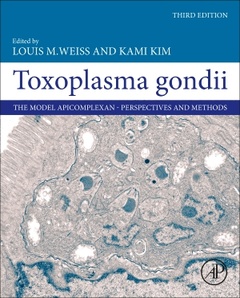Toxoplasma Gondii (3rd Ed.) The Model Apicomplexan - Perspectives and Methods
Coordonnateurs : Weiss Louis M., Kim Kami

Toxoplasma gondii: The Model Apicomplexan - Perspectives and Methods, Third Edition, reflects significant advances in the field in the last five years, including new information on the genomics, epigenomics and proteomics of T. gondii, along with a new understanding of the population biology and genetic diversity of this organism. This edition expands information on the effects of T. gondii on human psychiatric disease and new molecular techniques, such as CAS9/CSPR. T gondii remains the best model system for studying the entire Apicomplexa group of protozoans, which includes Malaria, making this new edition essential for a broad group of researchers and scientists.
2. The Ultrastructure of Toxoplasma gondii
3. Molecular Epidemiology and Population Structure of Toxoplasma gondii
4. Human Toxoplasma Infection
5. Ocular Disease due to Toxoplasma gondii
6. Toxoplasmosis in Wild and Domestic Animals
7. Toxoplasma Animal Models and Therapeutics
8. Biochemistry and Metabolism of Toxoplasma gondii: Lipids and Nutrient Acquisition
9. Biochemistry and Metabolism of Toxoplasma gondii: Nucleotide and Amino Acid Metabolism
10. Biochemistry and Metabolism of Toxoplasma gondii: Carbohydrates and Metabolomics
11. The Apicoplast and Mitochondrion of Toxoplasma gondii
12. Calcium Storage and Homeostasis in Toxoplasma gondii
13. Signaling Networks in Toxoplasma gondii
14. Toxoplasma Secretory Proteins (Micronemes, Rhoptries, Dense Granules)
15. Toxoplasma Secretory Pathway, Intracellular Trafficking, and Autophagy
16. The Toxoplasma Cytoskeleton: Structures, Proteins and Processes (Need to include actin)
17. Toxoplasma Host Effectors in Cell Interactions
18. Bradyzoite and Sexual Stage Development
19. Development and Application of Classical Genetics in Toxoplasma gondii
20. Genetic Manipulation of Toxoplasma gondii
21. Epigenetic and Genetic Factors that Regulate Gene Expression in Toxoplasma gondii
22. Proteomics and Post Translational Protein Modifications in Toxoplasma gondii
23. ToxoDB: An Integrated Functional Genomic Resource for Toxoplasma and Other Sarcocystidae
24. Cerebral Toxoplasmosis: Pathogenesis, Host Resistance and Behavioral Consequences
25. Innate Immunity to Toxoplasma gondii
26. Adaptive Immunity and Genetics of the Host Immune Response
Parasitologists;Cell and molecular biologists;Immunologists;Research Clinicians;Neuroscientists;Food scientists
Dr. Kami Kim is a physician-scientist who joined the USF faculty in 2017 as a Professor of Internal Medicine (Infectious Diseases and International Medicine) and Professor of Global Health. Her laboratory focuses upon understanding the pathogenesis of toxoplasmosis and malaria, parasitic diseases of global significance. The Toxoplasma projects use a multidisciplinary systems biology approach to understand how the parasite senses and responds to changes in its host. Using a combination of epigenomics, genetics and proteomics, her group is studying how the parasite transitions from the pathogenic tachyzoite form to the persistent bradyzoite form. She is investigating the epigenetic and genetic factors that govern the host response to parasites. Dr. Kim is a fellow of the American Academy of Microbiology and the Infectious Disease Society of America as well as an elected member of the Association for American Physicians and the America
- Presents a complete review of molecular and cellar biology and immunology of Toxoplasma gondii combined with methods and resources for working with this pathogen
- Provides a single source reference for a wide range of scientists and physicians working with this pathogen, including parasitologists, cell and molecular biologists, veterinarians, neuroscientists, physicians and food scientists
- Covers recent advances in the genomics, related bioinformatics analysis, epigenomics, gene regulation, genetic manipulation and proteomics of T. gondii
- Details advances in the molecular and cellular biology and immunology of Toxoplasma, and in the epidemiology, diagnosis, treatment and prevention of toxoplasmosis
Date de parution : 03-2020
Ouvrage de 1242 p.
19x23.3 cm
Thème de Toxoplasma Gondii :
Mots-clés :
APETELA (AP2); Acetylation; Acidocalcisome; Acylglycerols; Adaptive immunity; Adhesion; Alveolins; Amylopectin; Animal models; Antigen presentation; Apicomplexa; Apicoplast; Asexual life cycle; Astrocyte; Autophagy; Auxotrophy; BioID; Bioinformatics; Blood–brain-barrier; Bradyzoite; Brain; Budding; CD4 Th1 cell; CD8 T cell; CNS; CRISPR/Cas9; Calcium; Calcium flux; Calcium-binding proteins; Calcium-dependent protein kinase (CDPK); Calmodulin; Cats; Cell autonomous immunity; Central carbon metabolism; Cerebral toxoplasmosis; Chorioretinitis; Chromatin remodeling; Cofactors; Conditional knockdown knockout; Congenital toxoplasmosis; Conoid; Cyclic nucleotide; Cyst wall composition; Cytoskeleton; Cytotoxic T cell; Dense granule; Dense granules; Diagnosis; Differentiation; Diversity; Drug targets; Drug therapy; Effector T cells; Effectors; Encephalitis; Endocytosis; Endodyogeny; Endosome; Energy metabolism; Epigenetics; Epiplastin; Epistasis; EuPathDB; Evolution determinants; Exocytosis; Fatty acids; Forward genetics; GRAs; Genetic manipulation; Genome-scale metabolic modeling; Genomics; Gliding motility; Glycerophospholipids; Glycosylation; Histone modification; History; IFN-gamma; IFN-?; Immune signaling; Immune-compromised hosts; Immunity; Immunopathology; Immunoregulation; Inflammation; Injection; Innate; Inner membrane complex; Intrauterine infection; Isoprenoid biosynthesis; Isoprenoid derivatives; Lipids in Toxoplasma; Lysosome; MICs; Macrogamete; Mass spectrometry; Merozoite; Metabolic network; Metabolism; Metabolomics; Methylation



